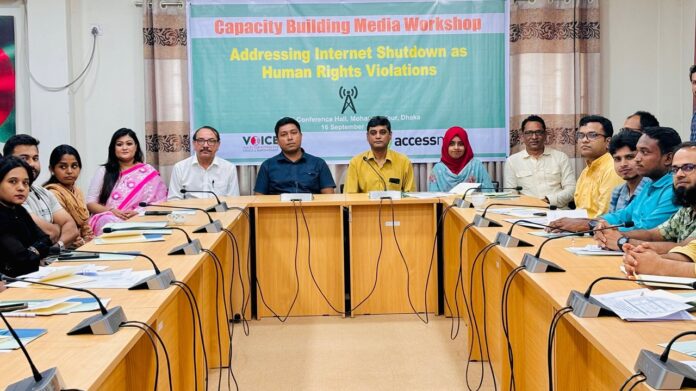BN Report
The internet has become an integral part of human life, essential for trade, education, healthcare, cultural evolution, and everyday activities, soany temporary disruption of internet access can have far-reaching negative impacts on various sectors, including social, economic, political, commercial, healthcare, education, entertainment, and even on fundamental rights such as freedom of expression.
These points were emphasized on Monday, 16 September, during a training workshop titled “Internet Shutdown and Bangladesh: The Global Situation.” The workshop was organized by the non-governmental research institute ‘Voice,’ with its Executive Director, Ahmed Swapan Mahmud, delivering the inaugural address.
In his speech, Mahmud noted that during elections, protests, or times of unrest, governments often resort to internet shutdowns to suppress alternative viewpoints and advocacy efforts—actions that run counter to the principles of a democratic society.
Musharrat Mahera, Deputy Director of ‘Voice,’ further explained the purpose of the training through a presentation. She highlighted that the internet has become a fundamental part of modern life, with its role expanding globally. People now rely on it as a central tool in various aspects of life.
Many assume that an internet shutdown refers solely to a complete halt in access, but its scope is much broader. It can involve temporarily blocking or permanently restricting access to social media platforms, messaging apps, specific websites, or news portals. According to the international advocacy organization ‘Keep It On,’ there are eight distinct types of internet shutdowns. Mahera noted that ‘Access Now,’ in partnership with ‘Voice,’ is working on a project focused on capacity development training regarding these issues.
As global internet usage increases, so do incidents of internet shutdowns. Governments in many countries disrupt internet access for a variety of reasons, such as controlling political events, mass protests, religious tensions, the spread of misinformation, or exam-related corruption—practices that are often considered unethical.
The UN’s Special Rapporteur on the promotion of freedom of expression declared in a 2011 report that internet access should be recognized as a human right. The report urged all countries to treat internet access as an essential human right and not to restrict the free flow of information without legitimate cause.
Several experts attended the event, including internet specialist Ashraful Haque, Brac University lecturer Saimum Reza Talukder, and Miraz Chowdhury, Managing Director of Digital Rights. Haque discussed censorship and the collection of various sources, while Talukder addressed the legal framework surrounding internet use in both Bangladesh and globally. Chowdhury spoke about the negative consequences of internet censorship and its broader implications.
The workshop also saw participation from 35 journalists representing different media outlets, who engaged in discussions and took part in the Q&A session.







